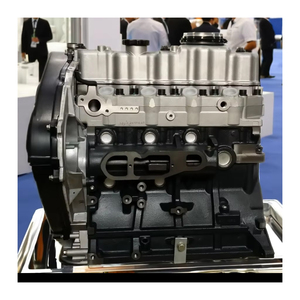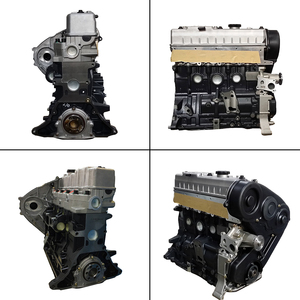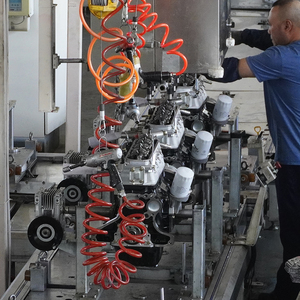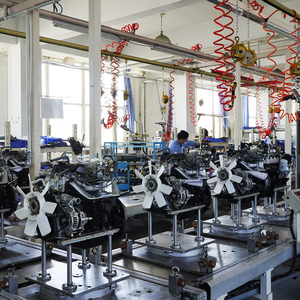
All categories
Featured selections
Trade Assurance
Buyer Central
Help Center
Get the app
Become a supplier

(5665 products available)
















































The Complete Engine Mitsubishi refers to engines manufactured by the Mitsubishi Corporation, a Japanese company. The engines are utilized in the production of vehicles. The Complete Engine Mitsubishi has several types, including:
Mitsubishi 4G6 Engines:
The Mitsubishi 4G6 engine is a petrol engine. It has four cylinders arranged in a line. The engine has different variants that offer different levels of power and performance. The 4G6 engine is used in various vehicles. It is well known for its smooth operation and good performance.
Mitsubishi 4D6 Engines:
The Mitsubishi 4D6 engine is a diesel engine. Just like the 4G6 engine, it has four cylinders that are arranged in a line. The engine is designed for durability and efficiency. It is mostly used in larger vehicles. For instance, trucks and SUVs. The 4D6 engine delivers a lot of torque which is useful for heavy loading and pulling.
Mitsubishi 6A Engines:
The Mitsubishi 6A engines are petrol engines with six-cylinder engines arranged in a V formation. They also have variable valve timing technology. The 6A engine offers a smooth and quiet operation with a lot of power. This makes it suitable for high-performance vehicles.
Mitsubishi 4B1 Engines:
Mitsubishi 4B1 engines are petrol engines with four cylinders. They are designed to be efficient and clean in energy. They are mostly used in smaller vehicles. The engines give out less noise and emissions without compromising performance.
Mitsubishi 4J Engines:
The Mitsubishi 4J engine is a diesel engine with four cylinders. It is designed for efficiency and low emissions. The 4J engine has features like intercooling and turbocharging that increase power output.
Mitsubishi 8B Engines:
The Mitsubishi 8B engine is a petrol engine with eight cylinders. It is designed for high performance. The engine is mostly used in sports and luxury vehicles.
Engine size
The capacity of a Mitsubishi 4-cylinder engine ranges from 1.0 to 2.5 liters. The engine size is as per the vehicle's design and model.
Engine type
The engines are inline 4-cylinder or V6 engines. The V6 engines have 3.0 to 3.8-liter capacities.
Fuel type
The engines run on unleaded petrol or diesel, depending on the engine type and model.
Power output
The engines produce between 50 and 250 kW of power, with higher-powered engines offering more power output.
Torque
The engines generate between 85 and 430 Nm of torque. The torque is distributed to the wheels through a manual or automatic transmission.
Features
Mitsubishi complete engines have different features depending on the engine. Some common features include:
- Multi-point fuel injection - Electronic control unit (ECU) - Variable valve timing - Turbocharging (in some models)
Maintenance
Like any other engine, proper maintenance of the Mitsubishi engine is crucial. It enhances engine performance and increases its lifespan. Here are some tips for maintaining a Mitsubishi engine.
- Follow the service schedule - Use genuine parts - Keep it clean - Use the right oil and change regularly - Check and replace filters - Check and replace spark plugs - Check and maintain cooling system - Maintain fuel system - Check and maintain exhaust system - Check and maintain ignition system - Check and maintain timing belt - Check and maintain electrical system
There are several factors to consider when choosing a Mitsubishi car engine, including:
Consider the vehicle
The first step in choosing a Mitsubishi engine is to consider the vehicle in which it will be installed. Different vehicles are designed to accommodate specific engines. For instance, a Mitsubishi Outlander is compatible with the 4B11 engines. The engine code must match the vehicle's requirements to ensure a proper fit and optimal performance.
Power and performance
Different Mitsubishi engines offer varying levels of power and performance. It is important to consider the desired performance level when choosing an engine. If high power output is required, consider the 6G75 engine, as it provides more power than the 4B11 engine. On the other hand, if fuel efficiency is a priority, the 4B11 engine may be a better choice due to its smaller size and lighter weight.
Fuel efficiency
Mitsubishi engines differ in fuel efficiency based on factors such as engine size, technology, and vehicle weight. Generally, smaller engines tend to be more fuel-efficient than larger ones. Additionally, engines with fuel-saving technologies like turbocharging or variable valve timing may provide better mileage. Evaluating the importance of fuel efficiency relative to other factors like power or size is crucial when selecting an engine.
Emissions regulations
Different regions have specific emissions regulations that engines must comply with. Before choosing a Mitsubishi engine, it is essential to verify its compliance with local emissions standards. Some engines may require additional modifications or components to meet stringent emissions regulations in certain areas.
Climate and operating conditions
Considering the climate and operating conditions where the vehicle will be used is also important. In extreme cold or hot climates, an engine with features like block heaters or engine warming components may be necessary. Similarly, if the vehicle will be used in hilly or off-road conditions, an engine with high torque and better cooling capabilities would be beneficial.
Replacing an engine can be a challenging project that requires adequate preparation and planning. Before starting, read the repair manual for the specific vehicle. The manual will provide important information, such as the engine's complete engine Mitsubishi code, which will help ensure the replacement engine will work with the vehicle.
Gather all the necessary tools for the job. This may include a jack and jack stands, a torque wrench, sockets and ratchets, wrenches, pliers, an engine hoist, and other basic hand tools. Have all the needed parts for the engine replacement on hand. This may include engine oil, a new oil filter, coolant, and others. It's also good to have replacement gaskets and seals available in case they are needed.
Ensure the new engine is properly prepared before installing it. Follow the manufacturer's instructions for preparing a new engine for installation. This may include adding oil to the engine, installing the oil filter, and other steps. Make sure to follow all safety precautions when working with engines. This includes using proper lifting techniques when removing or installing engines and handling engine fluids safely.
Set aside enough time to complete the engine replacement. Depending on the skill level, replacing an engine can take several hours or more. Start the project only if there is enough time to complete it without rushing. Working quickly to finish can lead to mistakes and increase the risk of injury.
Disconnect the battery and drain all fluids from the engine before starting the replacement. This will help prevent accidents and make the process cleaner. Follow the steps in the repair manual to remove the old engine safely. This will ensure the engine is removed properly and reduce the risk of damaging the vehicle or injuring oneself.
Install the new engine by following the steps in the repair manual. Make sure the engine is properly aligned and all bolts are torqued to the manufacturer's specifications. Reconnect all fluids, electrical connections, and other systems after installing the new engine. This will ensure the engine runs properly and prevents leaks or other issues.
Start the engine and let it run for a few minutes to ensure it works properly. Check for leaks, unusual noises, or other issues. If something is not right, troubleshoot the problem and fix it before driving the vehicle.
Q1: Is Mitsubishi's 4G63 a good engine?
A1: The 4G63 is a well-known and respected engine from Mitsubishi. It's a 4-cylinder engine with 16 valves and has been used in many Mitsubishi cars and some other brands. This engine is known for being strong and reliable. It can handle a lot of power without having problems. That's why it's popular for tuning and racing. The 4G63 engine can give good performance while being fuel efficient. It uses less gas compared to other engines with more cylinders. Overall, the 4G63 is a great engine choice from Mitsubishi.
Q2: What does the ""M"" in Mitsubishi engines stand for?
A2: The ""M"" in Mitsubishi engines is a code used in their engine naming system. The ""M"" code represents the family of engines that includes the 4G63 and other similar engines. These engines are known for their reliability and performance. They have been used in many Mitsubishi models over the years.
Q3: What is the Mitsubishi 4B11 engine?
A3: The Mitsubishi 4B11 engine is a part of the 4B1 family of engines. It is a modern engine design that is used in many Mitsubishi models. The 4B11 engine has a DOHC (Dual Overhead Camshaft) configuration with 16 valves. It is known for being fuel efficient and meeting strict emission standards. The 4B11 engine provides good performance for everyday driving needs.